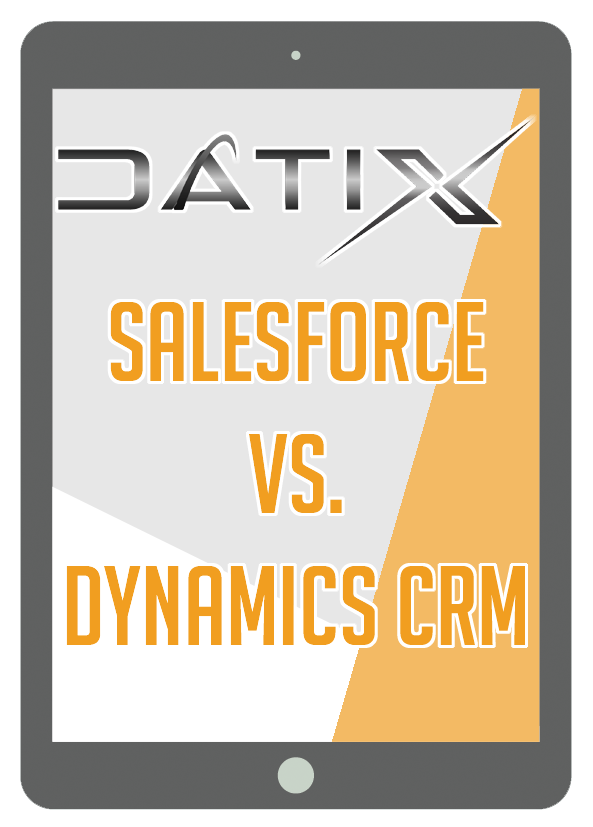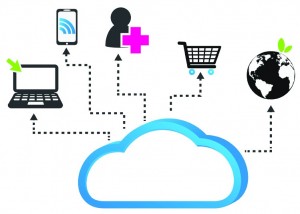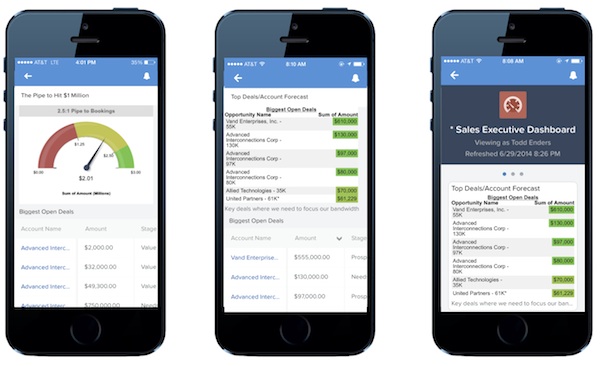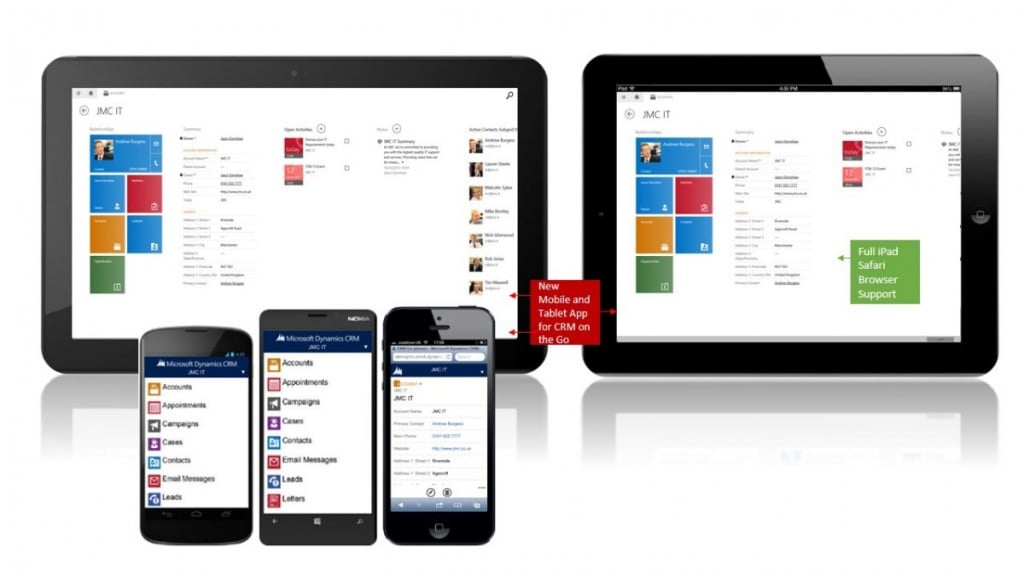
As both a Salesforce and Microsoft Dynamics certified partner, Datix Inc., has a rare, unique insight into two of the most popular CRM systems on the market today. In light of this, we have been conducting a four part series on our blog in which we will compare and pit these two powerful pieces of software against each other in order to help you determine which might be the best CRM for your business. Considering the fact that both Salesforce and Dynamics received flashy updates this year in order to better equip themselves against the other in features like email integration and mobile capability, it is harder than ever to decipher what you really need out of CRM and which vendor will help you achieve that. Our updated ‘Software Showdown’ series is designed to help you start picking the best 2015 CRM system for you. Our evaluation includes key factors that business are often looking for: reporting functionality, CRM mobility, and more.
In the first part of our head to head series featuring Salesforce and Microsoft Dynamics CRM we looked at reporting capabilities. In the next section of our CRM showdown we turn to to CRM mobility. To read the full comprehensive report download our guide.
Over the totality of our series we have reviewed:
- Reporting
- CRM Mobility
- Outlook Integration
- Comprehensive Overview
- We’ve also **added a development comparison as well**
Comparing CRM Mobility – Salesforce vs MS Dynamics CRM
The winner out of the gate (for now)
When it comes to CRM mobility there is a clear leader between the two systems as it relates to functionality and interface. Despite this, both vendors have been making serious strides toward mobile capability in 2015; Salesforce and Microsoft announced new mobile features and integration with their recent updates. As we touched upon in part 1, although both Dynamics and Sales Cloud perform CRM functions, the two systems are not an apples to apples comparison and have different features and capabilities that will make them better aligned to specific business processes. Deciphering which software would be the best for your organization is really about using the right tool for the right job. And in this case, Salesforce is the clear CRM mobility leader. Not just against MS Dynamics CRM (which we should note is fast catching up,) but against the entire industry.
To get the comprehensive review of both systems access our free report above.
Best In Its Class
You’d be hard pressed to find the kind of functionality, reporting, interface, and ease-of-use on a mobile phone in any other system outside of Salesforce. Salesforce has made this their competitive advantage. As an end user on the customer relations, sales, or management side of business, Salesforce offers a complete experience. It’s really the only CRM to offer the full client/desktop experience on your phone; including dashboards and reporting. With the recent release of SalesforceIQ, Salesforce has created a rich mobile experience for every CRM user that has all of the same capabilities as the desktop version; automated data capture, lead creation and tracking directly inside your email inbox and the ability to launch data-driven marketing campaigns within the Salesforce1 App. The functionality that Salesforce promises on mobile is unparalleled: if you have a large cohort of traveling sales team members or just happen to do a lot of your outside of the office, consider Salesforce.
If you’re a sales user for example, you can bus between clients all day long creating contacts, managing activities, drawing reports, and looking at dashboards, all while using voice data entry along the way if you like. Not to mention that new automation updates in 2015 will have already significantly cut down on your entry times: contact info and key information is captured from your meeting records and email inbox. So you can truly create reports and knowledgeably check in on clients with mere taps on your smartphone touchscreen. Salesforce1 and now SalesforceIQ provide the entire desktop CRM experience for the remote or traveling employee in a way that is easy to navigate and intuitive to use. Not only that, but Salesforce enhances its CRM mobility experience by augmenting it with the power of their app store. The app store is a robust network of applications and integrations that can be added to a companies CRM setup to sync with other systems (i.e. your ERP system so that reps can check in on product inventory during client meetings or monitor predicted manufacturing dates) and provide added features to the already powerful Salesforce arsenal. (like Datix Unity for Salesforce).
How Microsoft Dynamics is Catching Up Fast
MS Dynamics CRM has consistently offered a very robust and complete offering on a tablet device; however only recently has Microsoft attempted to catch up to Salesforce in the mobile arena. The 2015 update came will an all-new CRM for phones app that promises to provide the same robust CRM desktop functionality as the company’s Dynamics offering. By leveraging cloud functionality, MS Dynamics looks to be gunning for Salesforce’s pedestal as the clear-cut winner of CRM mobility.
The new Dynamics mobile application comes with a native interface which will allow users to quickly navigate through apps and CRM displays on the go. This can greatly decrease the time it takes for sales teams to place orders, provide quotes and expedite shipping during client meetings. The same functions that reps use everyday in the office; emailing leads, collecting sales data and closing deals, can happen within the new CRM for phones app. Businesses will be able to drive their ROI with greater efficiency and go into client meetings more confidently. However, it is worth noting that while Microsoft has invested heavily in new mobile functions for its CRM offering, it is still a very new concept. Compared with Salesforce, who have hinged their business model on mobile capability, Microsoft is still taking baby steps out into the world of personal devices.
Should Mobility Be Important?
While Salesforce is the clear winner in the CRM mobility category, all of the flashy capability doesn’t really matter very much if your organization won’t utilize the mobile functions of CRM very often. You may find your organization really only needs the functions of something like Dynamics CRM on a mobile device, or that if you are already running Microsoft programs that Dynamics for phones is a great fit for your team members. As time goes on and the CRM arms-race gets ever closer and more competitive, the two best CRM systems are becoming more similar in their mobile capability and usability. As it becomes harder to distinguish between the two different mobile platforms, you should really look at the reporting, pricing, and Outlook/Sharepoint integration aspects of the products as well to determine which might be the better fit for your organization and what you need to prioritize in your CRM system.
If your organizational culture has a strong propensity for mobility – traveling salesforce, remote workers, and a flexible, fast-paced environment – there’s a good chance you would benefit from the advantages of strong CRM mobility. If that’s the case, Salesforce is currently still the best in class as Microsoft Dynamics CRM takes its first steps out into the world of mobile apps.




